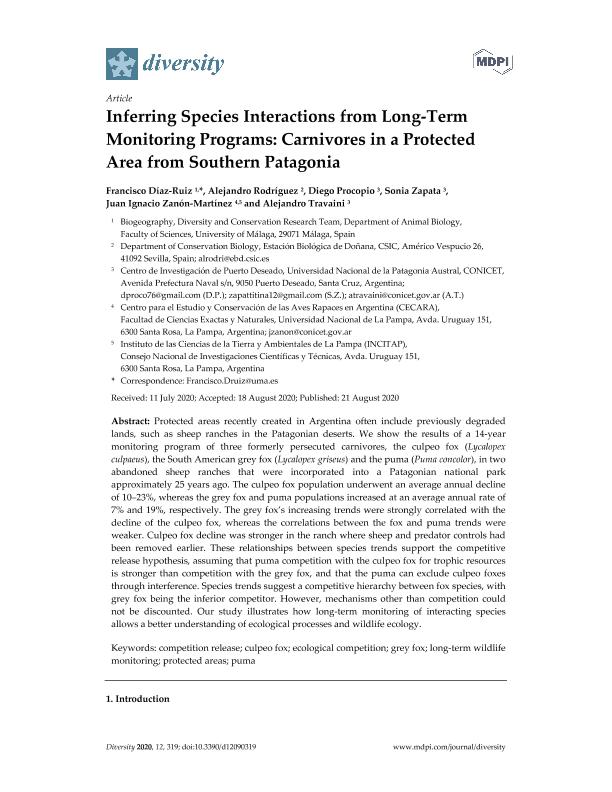Mostrar el registro sencillo del ítem
dc.contributor.author
Díaz Ruiz, Francisco
dc.contributor.author
Rodríguez, Alejandro
dc.contributor.author
Procopio, Diego Esteban

dc.contributor.author
Zapata, Sonia Cristina

dc.contributor.author
Zanón Martínez, Juan Ignacio

dc.contributor.author
Travaini, Alejandro

dc.date.available
2022-09-23T19:35:12Z
dc.date.issued
2020-08
dc.identifier.citation
Díaz Ruiz, Francisco; Rodríguez, Alejandro; Procopio, Diego Esteban; Zapata, Sonia Cristina; Zanón Martínez, Juan Ignacio; et al.; Inferring species interactions from long-term monitoring programs: Carnivores in a protected area from southern Patagonia; Multidisciplinary Digital Publishing Institute; Diversity; 12; 9; 8-2020; 1-18
dc.identifier.issn
1424-2818
dc.identifier.uri
http://hdl.handle.net/11336/170299
dc.description.abstract
Protected areas recently created in Argentina often include previously degraded lands, such as sheep ranches in the Patagonian deserts. We show the results of a 14-year monitoring program of three formerly persecuted carnivores, the culpeo fox (Lycalopex culpaeus), the South American grey fox (Lycalopex griseus) and the puma (Puma concolor), in two abandoned sheep ranches that were incorporated into a Patagonian national park approximately 25 years ago. The culpeo fox population underwent an average annual decline of 10-23%, whereas the grey fox and puma populations increased at an average annual rate of 7% and 19%, respectively. The grey fox's increasing trends were strongly correlated with the decline of the culpeo fox, whereas the correlations between the fox and puma trends were weaker. Culpeo fox decline was stronger in the ranch where sheep and predator controls had been removed earlier. These relationships between species trends support the competitive release hypothesis, assuming that puma competition with the culpeo fox for trophic resources is stronger than competition with the grey fox, and that the puma can exclude culpeo foxes through interference. Species trends suggest a competitive hierarchy between fox species, with grey fox being the inferior competitor. However, mechanisms other than competition could not be discounted. Our study illustrates how long-term monitoring of interacting species allows a better understanding of ecological processes and wildlife ecology.
dc.format
application/pdf
dc.language.iso
eng
dc.publisher
Multidisciplinary Digital Publishing Institute
dc.rights
info:eu-repo/semantics/openAccess
dc.rights.uri
https://creativecommons.org/licenses/by/2.5/ar/
dc.subject
COMPETITION RELEASE
dc.subject
CULPEO FOX
dc.subject
ECOLOGICAL COMPETITION
dc.subject
GREY FOX
dc.subject
LONG-TERM WILDLIFE MONITORING
dc.subject
PROTECTED AREAS
dc.subject
PUMA
dc.subject.classification
Ecología

dc.subject.classification
Ciencias Biológicas

dc.subject.classification
CIENCIAS NATURALES Y EXACTAS

dc.title
Inferring species interactions from long-term monitoring programs: Carnivores in a protected area from southern Patagonia
dc.type
info:eu-repo/semantics/article
dc.type
info:ar-repo/semantics/artículo
dc.type
info:eu-repo/semantics/publishedVersion
dc.date.updated
2022-09-22T15:11:21Z
dc.journal.volume
12
dc.journal.number
9
dc.journal.pagination
1-18
dc.journal.pais
Suiza

dc.journal.ciudad
Basilea
dc.description.fil
Fil: Díaz Ruiz, Francisco. Universidad de Málaga; España
dc.description.fil
Fil: Rodríguez, Alejandro. Consejo Superior de Investigaciones Científicas. Estación Biológica de Doñana; España
dc.description.fil
Fil: Procopio, Diego Esteban. Consejo Nacional de Investigaciones Científicas y Técnicas; Argentina. Universidad Nacional de la Patagonia Austral. Unidad Académica Caleta Olivia. Centro de Investigaciones Puerto Deseado; Argentina
dc.description.fil
Fil: Zapata, Sonia Cristina. Universidad Nacional de la Patagonia Austral. Unidad Académica Caleta Olivia. Centro de Investigaciones Puerto Deseado; Argentina
dc.description.fil
Fil: Zanón Martínez, Juan Ignacio. Consejo Nacional de Investigaciones Científicas y Técnicas. Instituto de Ciencias de la Tierra y Ambientales de La Pampa. Universidad Nacional de La Pampa. Facultad de Ciencias Exactas y Naturales. Instituto de Ciencias de la Tierra y Ambientales de La Pampa; Argentina
dc.description.fil
Fil: Travaini, Alejandro. Consejo Nacional de Investigaciones Científicas y Técnicas; Argentina. Universidad Nacional de la Patagonia Austral. Unidad Académica Caleta Olivia. Centro de Investigaciones Puerto Deseado; Argentina
dc.journal.title
Diversity
dc.relation.alternativeid
info:eu-repo/semantics/altIdentifier/url/https://www.mdpi.com/1424-2818/12/9/319
dc.relation.alternativeid
info:eu-repo/semantics/altIdentifier/doi/http://dx.doi.org/10.3390/d12090319
Archivos asociados
